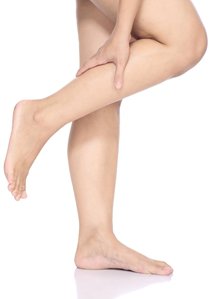
Pregnancy has a pretty well-known reputation for causing a variety of sometimes wacky symptoms. From hair growth, to weight gain, to unexplained food cravings, there’s a lot that pregnancy does to your body. Much of the time, these symptoms are the direct result of pregnancy hormones like estrogen, human chorionic gonadotropin and progesterone, which go through many changes during the course of a pregnancy. However, they’re not always the clear culprits behind some symptoms. Take leg cramps, for example. Many women experience painful muscle contractions in their legs at night during the second and third trimesters. So what causes them, and what can you do to stop them?
What’s the science behind leg cramps?
Unfortunately, there’s no clear answer as to why some women experience leg cramps during pregnancy. But while there’s no solid science behind them, there are a few educated guesses that health experts have made. For example, they might happen because your legs are tired at night from carrying around the extra weight you gain during a pregnancy. Or, they might get aggravated by the pressure that your expanding uterus puts on the blood vessels that carry blood from your legs back to your heart. This pressure could also be affecting the nerves that run between your pelvic area and your legs. While these are valid points, they’re still just theories.
Can leg cramps be prevented?
There are some steps you can take to reduce your chances of getting leg cramps at night during your pregnancy. Start by staying active throughout the day – take up prenatal yoga or ask your health care provider about an exercise regimen you can safely take on. If your muscles are worked out on a regular basis, they’re less likely to cramp up. You should also drink plenty of water, because muscles are more prone to cramping when they’re dehydrated. In addition, some studies have suggested that taking magnesium supplements or eating magnesium-rich foods can help reduce the prevalence of leg cramps during pregnancy. Ask your health care provider first, and if you get the green light, load up on whole grains, beans, dried fruits, nuts and seeds. Finally, before you go to bed, you should take a few moments to stretch your legs, specifically your calves, which tend to cramp up the most.
What can you do if you wake up with a cramp?
If a serious leg cramp robs you of your much-needed sleep during a pregnancy, you can make it a bit shorter and less painful. While it might not feel good at first, try stretching the muscle that’s cramping by flexing your foot. You can also try massaging the muscle gently to help relax it, or putting a heating pad on it to achieve the same goal. Getting up and walking around for a few minutes can also help ease the pain. When you get back into bed, try elevating your legs with a pillow.


Wat Causes The Front Hair To Go Off When Breastfeeding